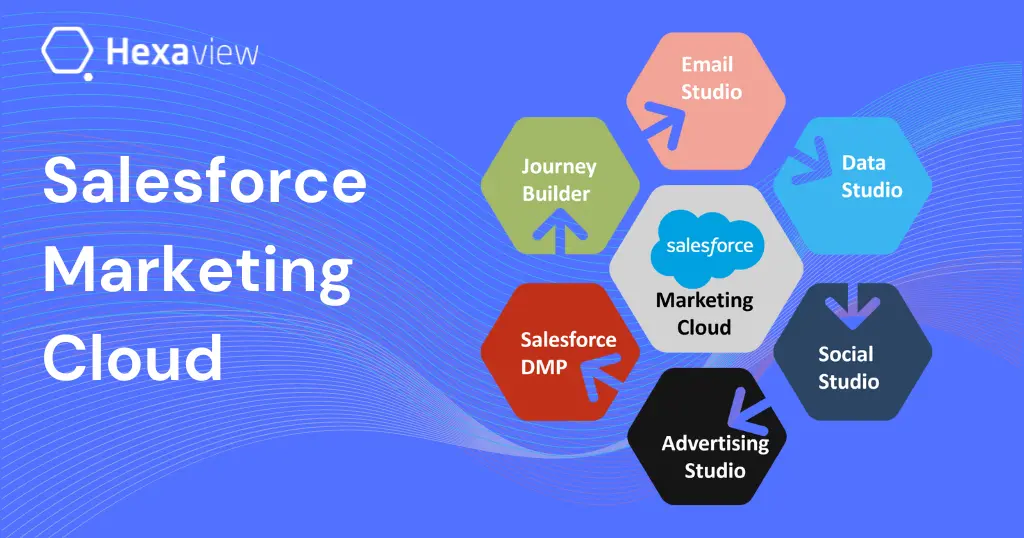Salesforce popularized and launched the phrase “Marketing Cloud” in 2000 under the name ExactTarget. Salesforce Marketing Cloud is a cloud-based digital marketing platform that helps firms manage and automate their marketing operations across numerous channels, including email, social media, mobile, and web.
Salesforce Marketing Cloud emerged because of Salesforce’s 2013 acquisition of many marketing technology companies, including ExactTarget. ExactTarget was a leading email marketing platform, and its integration with Salesforce’s product portfolio served as the cornerstone for the Marketing Cloud offering.
Salesforce Marketing Cloud has enhanced and broadened its capabilities since its start, including new features such as customer journey mapping, personalized content generation, marketing automation, analytics, and more. Organizations invest in Salesforce Marketing Cloud (SFMC) to combine all marketing channels in one place. Ultimately, marketers are able to send personalized messages, through the right channel, at the right time. It has evolved into a comprehensive corporate solution for orchestrating and optimizing marketing campaigns and consumer interaction initiatives.
Although Salesforce Marketing Cloud contributed to popularizing the phrase “marketing cloud,” other companies provide similar cloud-based marketing systems with varied features and capabilities. Marketing cloud refers to the integration of marketing technologies and data into a unified platform, allowing marketers to streamline their operations and provide personalized experiences to their target audience.
New Marketing Cloud Technologies
- Audience Studio (formerly Salesforce DMP): “capture data from any source and device”, “discover new audiences…analyze billions of profiles and trillions of events to find new high-value segments”, 1-to-1 ad targeting on any device.
- Data Studio: gives you access to data lakes that leverage anonymized data for advertising. Note: Data Studio is only available with Audience Studio.
- Marketing Cloud Einstein: Einstein is Salesforce’s collection of AI-enabled features. The following features act as a wrapper around other Marketing Cloud features: Send Time Optimization (Email Studio), Einstein Scoring Splits (Journey Builder), Einstein Engagement Scoring, Einstein Email/Web Recommendations, Einstein Content Selection/Content Tagging (Content Builder) – and more.
- Marketing Cloud Intelligence (formerly Datorama): A marketing analytics platform to unify data from all of your marketing tools (performs ETL for multiple data sources) so you have one source of truth. The Datorama Marketplace enables developers to create custom apps that leverage the platform’s layer of marketing intelligence technology.
- Distributed Marketing: marketing across advisors, franchisees, and partners. By giving controlled access to your marketing assets, maintain branding, compliance, and track partner audience engagement.
Marketing cloud solutions provide a consolidated method for firms to manage their client data. These platforms provide marketers with a holistic view of their customers by bringing together numerous data points such as demographics, preferences, purchase history, and engagement indicators.
As these are the benefits of the marketing cloud platforms, the marketers are adopting to these patterns and implementing them to make a more compelling B2B marketing strategy. Let’s See what the marketers are doing with the features offered by the marketing cloud platforms:
- Get the insights: Marketers can acquire significant insights into customer behavior and preferences because of this thorough understanding, allowing them to build more focused and tailored campaigns. Now Marketers work with demographics and hence they can focus on the right customer at the right place understanding their preference. Businesses may adjust messaging and content to individual tastes with a better understanding of their customers, resulting in increased customer happiness, engagement, and conversion rates.
- Personalization: The capacity to personalize at scale is one of the primary benefits of marketing cloud systems. Hence, marketers have adopted this pattern and made personalization an important aspect to gain more customers. These platforms make use of advanced segmentation and personalization capabilities, allowing marketers to provide highly personalized experiences to individuals or certain customer segments.
- Targeted campaigns: Marketers adopted the pattern of designing dynamic and targeted campaigns that resonate with their target audience by evaluating customer data and habits. This individualized strategy assists firms in strengthening client interactions, developing loyalty, and encouraging repeat business. Customers are more likely to engage with and respond favorably to marketing initiatives if the information is relevant to their individual requirements and interests.
- Orchestration of multichannel campaigns: Furthermore, marketing cloud solutions allow for the orchestration of multichannel campaigns. Marketers may develop, execute, and track campaigns using a variety of channels such as email, social media, mobile, and web. This adaptation towards the multichannel strategy enables consistent messaging and brand experiences at all touchpoints.
Businesses boost their chances of catching client attention and increasing conversions by reaching out to them wherever they are and creating a consistent brand experience. Marketers can engage with customers at many touchpoints and build a more holistic customer journey by seamlessly integrating campaigns across several channels.
Overall, Marketing Cloud has progressed from simple email marketing tools to full platforms that enable marketers to coordinate tailored, multichannel campaigns. They provide significant customer insights and automate different marketing operations. To expand their capabilities, modern Marketing Cloud integrates advanced analytics, artificial intelligence (AI) technologies, and customer relationship management (CRM) systems. This integration enables marketers to provide more powerful and relevant experiences to their customers, resulting in higher engagement and better commercial outcomes.



%201.svg)
